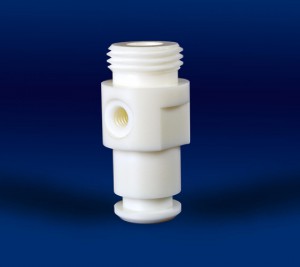How Plastic Screw Machining is Advantageous for Industrial Applications
 Plastic screw machining is often considered as an effective method for a variety of industrial applications. As a machining process, it is chosen for specific applications that require fasteners with certain weight, as well as thermal, electrical, chemical, environmental properties.
Plastic screw machining is often considered as an effective method for a variety of industrial applications. As a machining process, it is chosen for specific applications that require fasteners with certain weight, as well as thermal, electrical, chemical, environmental properties.
Also, the properties of a plastic fastener can be easily altered by using different techniques such as strengthening the basic material, alloying, adding lubricants to the manufacturing process.
Benefits of Plastic Screw Machining
The following showcase that plastic screw machining has the capabilities to meet a variety of industrial application requirements.
- Flexibility in terms of Material Usage: One of the biggest advantages of plastic screw machining is that plastic fastener manufacturers have the freedom to utilize a variety of plastic materials in their manufacturing process. On an average, plastic fastener manufacturers can accommodate up to 75 different types of plastic materials to meet the eclectic needs of their industrial clients.
- Meeting Varied Design Requirements: In plastic screw machining, the material used to produce the fastener can be altered to meet several design properties such as temperature, strength, flexibility or rigidity (based on the application) light weight, electrical properties and chemical resistance. Plastic screw machining can also incorporate design aspects such as undercuts, threading, special colors and even metal filler for added strength, if required. This also significantly reduces the overall pricing of the finished components.
- Variety of Production Machines: Most manufacturers do not rely on one type of manufacturing process to produce the fasteners. They usually utilize 3 to 4 machining processes, allowing them to accommodate various orders at the same time. Generally, one will find the following types of machines used in plastic screw machining:
- Specialized screw machines
- 2G Brown/Sharpe
- OOG Brown/Sharpe
- OG Brown/Sharpe
- Cam swiss screw machines
- CNC swiss style screw machines
- CNC turning centers with live tooling
- CNC turning centers
-
- Different Sizes and Shapes: Plastic screw machining has the flexibility to accommodate different types of fasteners including screws, rivets, inserts, pin fasteners, spacers and grommets. Specifications such as diameter and tolerances are taken into consideration during the design phase itself. Generally plastic fastener manufacture can produce products with diameter ranging from .060″ to 3″. The plastic screw machining process can also design fasteners with tolerance levels more than +/-.0005.
- Achieving Look and Feel of Metal Fasteners: Manufacturers can utilize plastic screw machining to create fasteners that emulate certain aspects of metal fasteners. A small example of this would be plastic fasteners can be designed with the same shape and dimensions of standard metal screws and rivets. However, this method is slightly limited and can only be done with the behest of the client.
The versatility of plastic screw machining makes it an affordable option for a variety of industries such as electronics, aerospace, medicine, and semi conductors. As one can see, plastic screw machining can be chosen s a viable option for manufacturing industrial fasteners and components.
